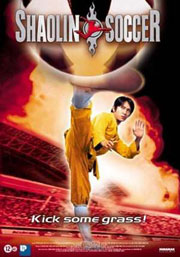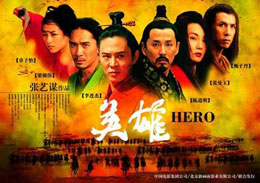Great
Chinese Film Invasion
PAGE 1 OF 2
In 2004 American moviegoers will be treated to a bumper crop of Chinese films with blockbusting potential.
Shaolin Soccer
A Kung-Fu Jim Carrey
Hero
Zhang Yimou's CTHD
Infernal Affairs
Instant Good-Cop/Bad-Cop Classic
Crouching Tiger, Hidden Dragon Prequel
Bid for Another Miracle
GREAT CHINESE FILM INVASION of 2004
 hinese films have always been a guilty pleasure. We liked seeing Asian faces on our heroes but were a bit embarrassed to be seeking affirmation across the Pacific. That changed in 2000 when a Chinese martial arts flick grossed $100 million to become the year's most profitable release, foreign or domestic -- then went on to win gleaming respectability in the form of four Oscars.
hinese films have always been a guilty pleasure. We liked seeing Asian faces on our heroes but were a bit embarrassed to be seeking affirmation across the Pacific. That changed in 2000 when a Chinese martial arts flick grossed $100 million to become the year's most profitable release, foreign or domestic -- then went on to win gleaming respectability in the form of four Oscars.
The fact that Crouching Tiger, Hidden Dragon did it with Chinese locations, Chinese actors, English subtitles and a skimpy $12 million budget heralded a Chinese martial arts renaissance. Suddenly, it was considered financially smart and culturally chic for major Hollywood players to go sniffing around for Chinese projects.
[CONTINUED BELOW]


